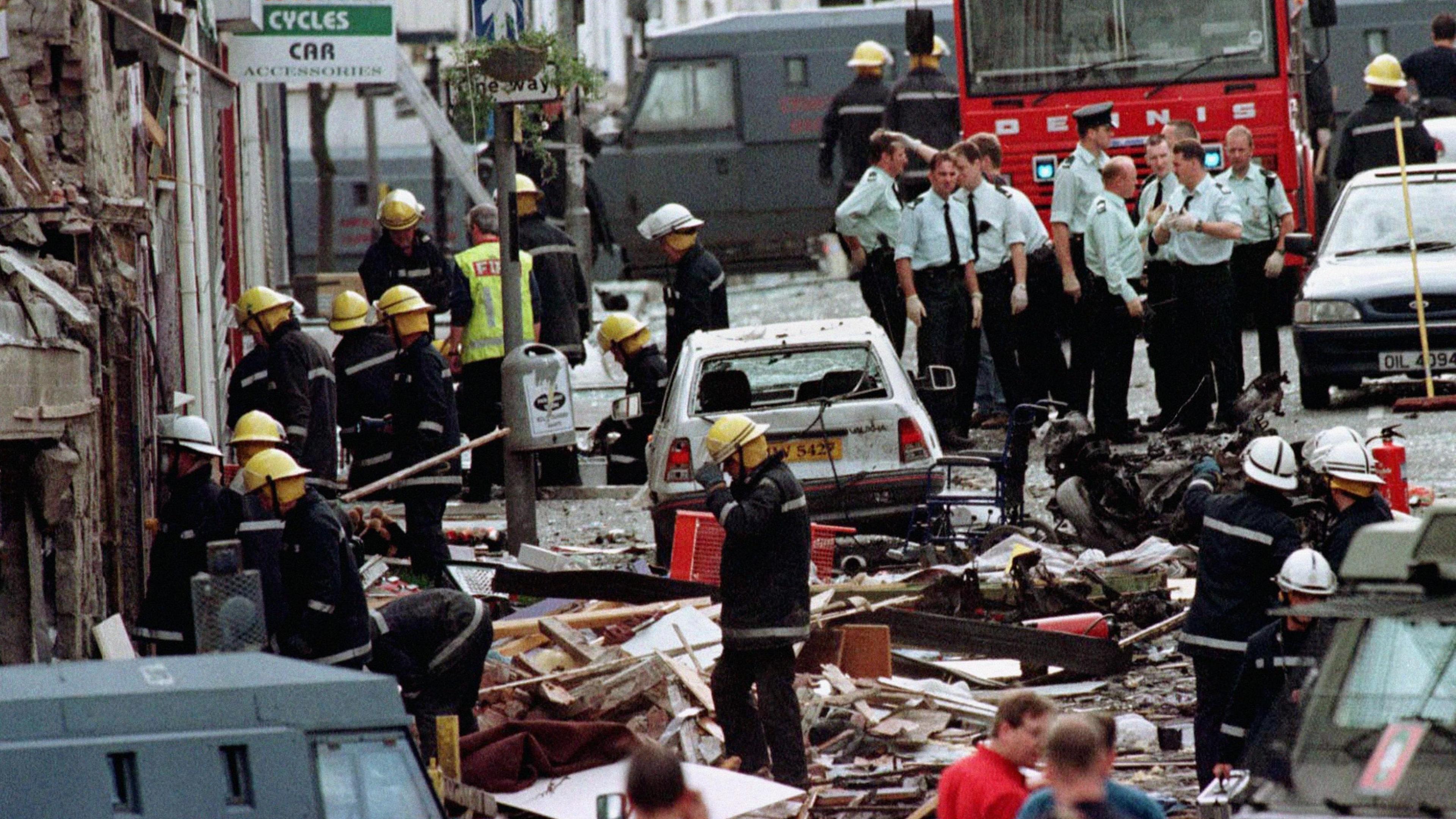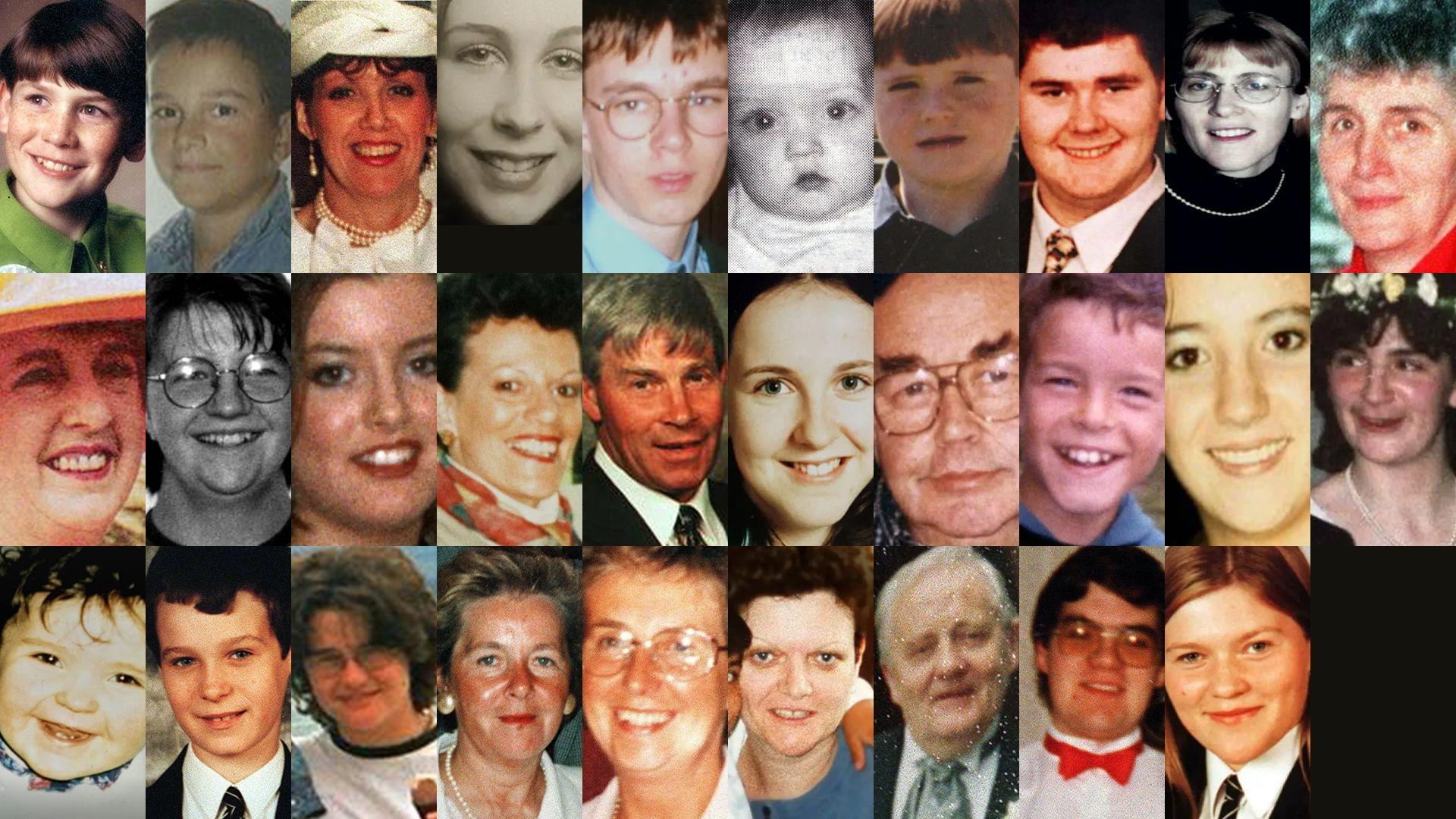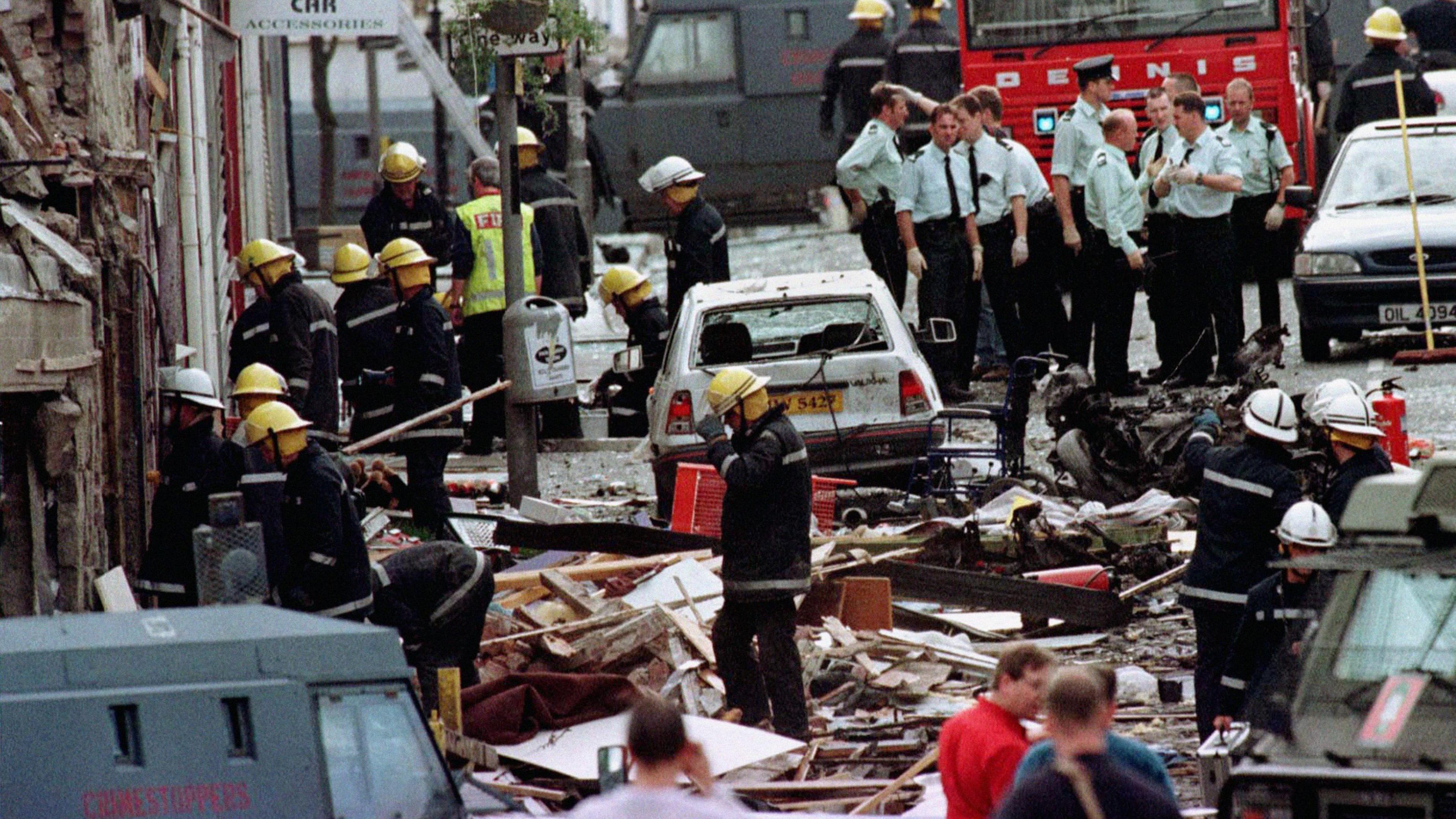Bomb victims are 'sick and tired' of Dublin platitudes

The bomb exploded in the market town on a busy Saturday afternoon
- Published
There is a "moral, human and legal imperative" on the Republic of Ireland government to establish a parallel inquiry into the Omagh bombing, the official inquiry in Northern Ireland has heard.
The counsel for some of the families of victims and survivors said they were "sick and tired of platitudes, false promises and the grand but empty words from the state authorities of the Republic of Ireland".
The Real IRA attack on 15 August 1998 murdered 29 people, including a woman who was pregnant with twins.
The Taoiseach (Irish prime minister) Micheál Martin has said both he and the Tánaiste (Irish deputy prime minister) are clear in the need for their government to co-operate fully with the inquiry.
The public inquiry was established to examine if the attack could have been prevented by UK authorities.
The Omagh bombing inquiry opened its second chapter on Monday.
'Speaks far louder'
On Tuesday, the inquiry heard perpetrators of the bombing enjoyed "cowardly refuge" in the Republic of Ireland.
The inquiry heard the failure of the Republic of Ireland to establish a parallel inquiry was a source of upset for the families.
The Irish government's "ongoing failure to provide real and meaningful co-operation with this inquiry speaks far louder than their words," Alan Kane KC said.
He said the memorandum of understanding, signed in April to allow the inquiry access to material held by the Irish government, did "nothing to give our clients any degree of confidence".
He said the unilateral power of redaction remained with the government of the Republic of Ireland.
The inquiry heard sharing of intelligence between the UK and Irish security services was not productive because it was rare for An Garda Síochána (Irish police) to share information "which would allow for pre-emptive operational action against subversives".
Omagh bomb: The 29 victims
- Published28 January
Omagh bomb: Timeline of families' bid for justice
- Published28 January
Omagh bomb 'still fresh' for families 25 years on
- Published15 August 2023
Mr Kane raised concerns about documentation which had not been disclosed to the inquiry including a missing "threat book".
He outlined what he said was "a most astonishing, shocking and incredible revelation" which was provided in a corporate witness statement from the Police Service of Northern Ireland (PSNI).
Security policy meetings attended by the Northern Ireland secretary and other senior representatives have only been found for 1996, but none for 1997 and 1998.
Mr Kane told the inquiry the absence of that material left "our clients with a distinct lack of confidence and assurance in the co-operation of the state core participants, in particular the PSNI".

The Omagh bombing killed 29 people, including a woman pregnant with twins
The legal counsel speaking on behalf of some of the victims and survivors of the Omagh bombing says that the security services "desire to protect state agents" could have allowed some terrorist activity to take place.
Speaking on the second day of the second chapter of the inquiry Hugh Southey KC outlined the role of intelligence services and informants in gathering information about dissident republican activity.
He noted that "the absence of any rules or guidance governing the use of informers" potentially allowed risks to be taken with public safety.
'Effective protection of the bomb'
Mr Southey KC also addressed the co-operation of the Republic of Ireland with the inquiry.
"There is little or no doubt that dissident republican activity linked to the bomb took place in the Republic of Ireland. That suggests that effective protection of the bomb potentially required the assistance of the Republic of Ireland's authorities.
"There is reason to believe that intelligence was known by the Garda but not the RUC."
He called for the "full engagement" of the Irish government so the victims and survivors can get to the truth.
Lord Turnbull said in closing that there is "plain duty" on the Secretary of State and others in government to make available whatever resources are necessary to ensure that "full disclosure can be swiftly made available".
In referring to the families concerns of missing documents Lord Turnbull said any claim that documents have been lost or destroyed will not be accepted on face value, yet they will be investigated with all the inquiry's powers.
"As the families have pointed out, claims of this sort have be devilled some previous inquiries."
In closing the inquiry on Tuesday, Paul Greaney KC said the security notes which the PSNI could not locate have been recovered by the inquiry from the NIO.
On Monday, Mr Greaney KC outlined the need for the core participants to work swiftly to fulfil the inquiry's requirements.
In February, the inquiry heard 14 days of powerful individual testimonies from relatives who lost loved ones in the explosion.
It also heard from emergency workers and people injured in the attack.
Irish government to co-operate
The Taoiseach has said he rejects comments that the Irish Government's co-operation with the Omagh bombing inquiry has been "wholly unsatisfactory".
Speaking to the Irish broadcaster RTÉ Micheál Martin said: "Both I and the Tánaiste are very clear of the need for our government and our department of justice and others, to be fully open in terms of materials to be sent to the Omagh inquiry, and to co-operate fully with the Omagh inquiry."
It comes as a barrister representing families of the victims and some of the injured said they remained "greatly disappointed" at the lack of commitment on the part of the Irish authorities to "meaningfully assist" the inquiry.
"There have been other legislative mechanisms by which we've done that, in the context of Kingsmills for example, which have been commented on positively.
"The difficulty with a parallel inquiry is that you have two inquires going on at the same time, in to basically the same issues and that could lead to a lot of duplication and delay," he added.
What was the Omagh bombing?
The bomb that devastated Omagh town centre in August 1998 was the biggest single atrocity in the history of the Troubles in Northern Ireland.
It came less than three months after the people of Northern Ireland had voted yes to the Good Friday Agreement.
Who carried out the Omagh bombing?
Three days after the attack, the Real IRA released a statement claiming responsibility for the explosion.
It apologised to "civilian" victims and said its targets had been commercial.
Almost 27 years on, no-one has been convicted of carrying out the murders by a criminal court.
In 2009, a judge ruled that four men - Michael McKevitt, Liam Campbell, Colm Murphy and Seamus Daly were all liable for the Omagh bomb.
The four men were ordered to pay a total of £1.6m in damages to the relatives, but appeals against the ruling delayed the compensation process.
A fifth man, Seamus McKenna, was acquitted in the civil action and later died in a roofing accident in 2013.
Related topics
- Published23 June

- Published22 February

- Published15 April
